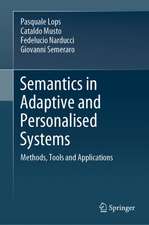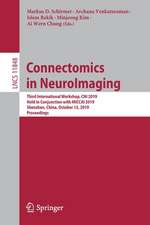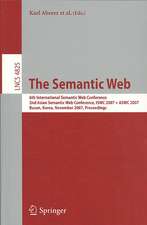KADS: A Principled Approach to Knowledge-Based System Development: Knowledge-Based Systems
Guus Schreiber, Bob Wielinga, Joost Breukeren Limba Engleză Hardback – mar 1993
* SPECIAL FEATURES:* KADS is the most widely used commercial structured methodology for KBS development in Europe and is becoming one of the few significant AI exports to the US.* Describes KADS from its Theoretical Basis, through Language and Tool Developments, to real Applications.
Preț: 800.90 lei
Preț vechi: 1001.12 lei
-20% Nou
Puncte Express: 1201
Preț estimativ în valută:
153.27€ • 166.43$ • 128.75£
153.27€ • 166.43$ • 128.75£
Carte tipărită la comandă
Preluare comenzi: 021 569.72.76
Specificații
ISBN-13: 9780126290400
ISBN-10: 0126290407
Pagini: 457
Dimensiuni: 152 x 229 x 26 mm
Greutate: 0.8 kg
Editura: ELSEVIER SCIENCE
Seria Knowledge-Based Systems
ISBN-10: 0126290407
Pagini: 457
Dimensiuni: 152 x 229 x 26 mm
Greutate: 0.8 kg
Editura: ELSEVIER SCIENCE
Seria Knowledge-Based Systems
Public țintă
AUDIENCEKBS and AI professionals, software engineers, academic research level AI and systems engineering.
Cuprins
Introduction and Overview. Theoretical Basis. Modeling Expertise. Modleing System: User Cooperation in KADS. A KADS Domain Description Language. Model Construction. Operationalizing Models of Expertise. KADS and Conventional Software Engineering. Languages and Tools. A Formal Language for KADS Models of Expertise. MODEL-K: Making KADS Run. Using OMOS to Represent KADS Conceptual Models. Shelley-Computer Aided Knowledge Engineering. Applications. The Paint Advisor: A Communicative Expert System. Managing and Maintaining an Operational KADS System. Rational Reconstruction of Diagnostic Expertise. Qualitative Prediction of Behavior. A KADS Conceptual Model of the ONOCIN Task. Applying KADS to the Sisyphus Domain. Using KADS to Analyze Problem-Solving Methods. Bibliography. Name Index. Subject Index.



























